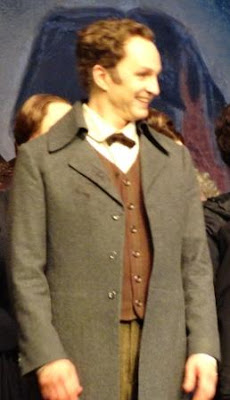(review in english below)
Der Fliegender
Holländer é uma ópera de R. Wagner
que já tive o privilégio de ver diversas produções.
O Teatro Schiller estará bem próximo do conceito de Wagner.
A orquestra está num fosso muito fundo e não é visível de grande parte dos
lugares.
A tela do quadro sobe e a acção passa-se por trás, extravasando
para a sala. Chega o primeiro navio. Daland e os seus homens que invadem a
biblioteca. Quando adormecem, espalhados pela sala, pelo cais e pelo navio,
surge o imponente e assustador navio fantasma. O impacto visual é magnífico!
Ao longo da ópera há uma mistura entre o sonho de Senta,
baseado no livro, e a realidade, com partes da acção passada na biblioteca e
outras, em simultâneo, na zona posterior do palco, sempre que a tela do quadro
se eleva.
A abordagem cénica é original, fantástica, muito eficaz e de belíssimo efeito. Há opções discutíveis, nomeadamente a festa final de casamento de Senta com o holandês em que todos se embriagam e que termina com o suicídio de Senta que corta o pescoço com uma taça de champanhe que parte previamente. Mas, no cômputo final, foi uma das melhores encenações que vi desta ópera.
A abordagem cénica é original, fantástica, muito eficaz e de belíssimo efeito. Há opções discutíveis, nomeadamente a festa final de casamento de Senta com o holandês em que todos se embriagam e que termina com o suicídio de Senta que corta o pescoço com uma taça de champanhe que parte previamente. Mas, no cômputo final, foi uma das melhores encenações que vi desta ópera.
O maestro Daniel
Harding foi responsável por uma boa direcção da orquestra que, contudo, no
início, teve algumas notas falhadas nos metais. O Coro esteve soberbo.
O barítono Michael
Volle destacou-se dos outros solistas pela sua excepcional interpretação,
cénica e vocal, do holandês. Tem uma voz ideal para o papel e foi imponente
sempre que esteve em palco.
Os restantes solistas estiveram bem mas não impressionaram:
****
DER FLIEGENDE HOLLÄNDER, Schiller Theater, Berlin, April
2013
Der Fliegender Holländer is na opera by R. Wagner that I had the privilege to see several different productions.
Der Fliegender Holländer is na opera by R. Wagner that I had the privilege to see several different productions.
The Schiller Theater will be very close to the concept of Wagner. The orchestra pit is very deep and is not visible to most of the seats.
The curtain opens up in a vast library with a large painting representing the sea which occupies nearly the entire back of the stage. At one side of the stage there are couches and at the other a long table. A girl, dressed in white, reads a big book about the story of the Dutchman and falls asleep on the couch.
The painting goes up and the action moves up behind the frame, invading the room. The first ship arrives. Daland and his men invade the library. When they fall asleep, around the room, the pier and the ship, arrives the imposing and scary ship of the Dutchman. The visual impact is magnificent!
The child wakes up and hides under the table. Daland, in exchange for his daughter Senta (she is the child is white) receives from the Dutchman a huge amount full of gold and other values.
Throughout the opera there is a mixture between the dream of Senta, based on the book, and the reality, with parts of the action in the library and others, simultaneously, at the back of the stage, whenever the screen frame rises.
The staging approach is unique, fantastic, very effective and of beautiful effect. There are debatable topics, particularly the marriage party of Senta to the Dutchman where everybody gets drunk and finishing with the suicide of Senta cutting her neck with a glass of champagne. But, all together, it was one of the best productions of this opera I've seen.
Conductor Daniel Harding directed the orchestra
with high quality. However, at start, a few notes had failed in metals. The
choir was superb.
Baritone Michael Volle outranked the other soloists for his exceptional interpretation, artistic and vocal, of the Dutchman. He has an ideal voice for the role and was impressive whenever he was on stage.
Simone Schröder’s Mary was also a top singer. She has a penetrating voice, tuned, with a great low register, and always well heard over the orchestra.
The other soloists were ok but not impressive:
Daland was interpreted by baritone Tobias Schabel. He is a singer with a good figure but he did not have a strong stage presence. The voice has a pleasant timbre but sometimes was not heard when the orchestra sounded lauder.
Baritone Michael Volle outranked the other soloists for his exceptional interpretation, artistic and vocal, of the Dutchman. He has an ideal voice for the role and was impressive whenever he was on stage.
Simone Schröder’s Mary was also a top singer. She has a penetrating voice, tuned, with a great low register, and always well heard over the orchestra.
The other soloists were ok but not impressive:
Daland was interpreted by baritone Tobias Schabel. He is a singer with a good figure but he did not have a strong stage presence. The voice has a pleasant timbre but sometimes was not heard when the orchestra sounded lauder.
Soprano Emma Vetter was the Senta. She was always very audible but in the
top register she lost quality and became a bit harsh.
Erik, by
tenor Stephan Rügamer, was another
singer who has just singed well, without any excitement.
But it was a performance of great quality, with a stunning production.
But it was a performance of great quality, with a stunning production.
****












